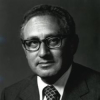Henry A. Kissinger

Henry A. Kissinger
Henry Alfred Kissingeris an American diplomat and political scientist. He served as National Security Advisor and later concurrently as United States Secretary of State in the administrations of presidents Richard Nixon and Gerald Ford. For his actions negotiating the ceasefire in Vietnam, Kissinger received the 1973 Nobel Peace Prize under controversial circumstances, with two members of the committee resigning in protest. Kissinger later sought, unsuccessfully, to return the prize. After his term, his advice has been sought by world leaders...
NationalityGerman
ProfessionStatesman
Date of Birth27 May 1923
CountryGermany
The first reactions are often instinctive. So one of the first things we said was that the Chinese had no right to inspect the plane, and that we had a sovereign right to. I don't know what the legal position is, but it was surely psychologically absolutely the unwise thing to do.
The Chinese, on the other hand, were in the position of having an American military spy plane on a Chinese military base and they had their own internal problems to deal with. At first, the Chinese weren't all that belligerent. They were just stalling to get their own bureaucracy in line.
You know, this is a very strange phenomenon. I keep reading that in American newspapers, and I keep reading extensive speculations. I meet with the Chinese leaders periodically, and while I don't say they've endorsed the missile shield, it has not been in the forefront of their discussions.
No, [the U.S.] has made it clear that we consider a peaceful resolution an essential aspect of American foreign policy. This I believe to be a situation understood by China, but again, it is important to not sound too truculent. Taking on a billion-plus Chinese is not an enterprise which one should enter lightly.
Americans believe that you can alter people by conversion, and that everybody in the world is a potential American. The Chinese also believe that their values are universal, but they do not believe that you can convert to becoming a Chinese unless you are born into it.
I want to get into the President's head some idea of what he can do. If military actions are recommended to him for decision, I want him to know what he is doing when he decides.
Congress can't do much more damage to us than they already have. To this extent we're liberated to do what is right. ... Our successors will be living in a nightmare if we don't do what is right.
an occasion to blow off their frustrations on an issue on which they didn't look as if they are begging (the United States) for help.
a review of withdrawal strategy ... seems in order.
My heart goes out to the president because I've served in an administration that faced a very divided country in a very difficult set of circumstances.
Because of the axiom that guerrillas win if they do not lose, stalemate is unacceptable, ... the military challenge in Iraq is more elusive.
Ninety percent of all politicians give the other ten percent a bad reputation.
I'm confident John Bolton will bring peace to the world before he brings peace to his relations with The New York Times,
We will go where the facts lead us,